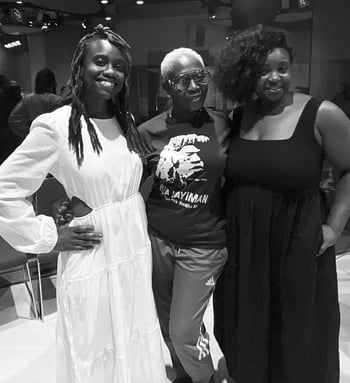 Percussionist Ches Smith and members of We All Break stood before the audience, conjuring that sweet spot where Haitian Vodou drumming and jazz come together. Looking out onto the space, the group began with a melodic a cappella, combining vocal chants from Daniel Brevil with the trio of vocalists at the center.
Percussionist Ches Smith and members of We All Break stood before the audience, conjuring that sweet spot where Haitian Vodou drumming and jazz come together. Looking out onto the space, the group began with a melodic a cappella, combining vocal chants from Daniel Brevil with the trio of vocalists at the center.
It made sense, perhaps, that the entire group wore sturdy shoes. How could such earth-moving melodies be released into the ether without a solid footing?
That larger-than-life sound came to Firehouse 12 on a recent Friday night, as We All Break performed during the venue’s weekly fall jazz series. As they mesmerized the audience in billowy gold silks, colorful dashikis and vintage dresses that recalled the likes of Sarah Vaughn and Billie Holiday, musicians made a case for Haitian music that felt bigger than the venue itself, reaching out across New Haven before the night was over.
Often, and perhaps fittingly, there was no need for translation. From the stage to the packed house, musicians were able to communicate the resilience, bravery, and joy of a culture—and centuries of music history—through entire universes of sound. Over two sets, it became clear how Toussaint Louverture resisted Napoleon: guns, machetes, and soul.
In the audience, a listener could feel it throughout the evening, as musicians transported attendees to a Haiti rarely seen and heard in the mainstream media. In “Here’s The Light,” an original song written by Brevil, Miguel Zenón’s raw alto saxophone wailed against, then folded into, Nick Dunston’s upright bass thumps, dazzling piano sprinkles from Matt Mitchell, and Brevil’s gripping vocals.
All the while, Smith, “Fanfan” Jean-Guy Rene and Markus Schwartz played pulsating, ceremonious Yanvalou rhythms, paying homage to Rada Spirits of the old kingdom of Dahomey. The land that was once the kingdom is present-day Benin, reminding listeners of a thick and complex web of colonialism and diaspora that is still echoing in Haiti and across the globe. Around them, melodies drifted through the air with bone-penetrating harmony, thanks largely to Sirene Dantor and two other vocalists new to the group.
It was a moment that captured the spirit of the night: Smith and We All Break gave the audience the solid jazz it wanted, but also the innovation that it needed. Their techniques engaged listeners’ minds, with polyrhythms meant to reunite one’s spirit to the drums' unrelenting call.
In this sense, they also guided listeners through rich history, polytonality, and a crash course in tanbou (drum), bas (set up of four drums), and Haitian Vodou music. They spoke and played through the evolution of Kreyol, told the story of Nigeria’s Nago, and delicately displayed the sonic and historic link between Cuba, Haiti, New Orleans, and Puerto Rico.
For those in the audience who were hooked, there was good news: We All Break’s CD “Path of Seven Colors,” from which several of Friday’s numbers came, was released in 2021 and is widely available. It brings a listener (at least, this listener, who stayed for back-to-back sets and could have lasted hours longer) into a new appreciation for timeless truth, a downpour of relentless notes and unyielding beauty.
Friday, audience members were excited to listen to the group; many already had plans to return for more (the venue's jazz series currently runs through mid-December). A longtime supporter named Bilal (he declined to give his last name), who eagerly makes the 45-minute pilgrimage to New Haven each week, had high praise for the musicians.
“These are the kinds of musicians you go to New York for,” he said. “They’re right there. You’re right there. It’s incredible.”
“Can you get a better place for live music?” chimed in an avid jazz series supporter named Sean, who has attended almost 10 shows at the venue and happily drives 30 minutes to get to the shows. “We are so close [to the musicians] you could almost turn the music for them …. You’re not seeing this at a Taylor Swift show. If I don’t support the music I love in New Haven, who else will?"
Shaunda Holloway is a writer, artist, and curator based in Hamden. Read more about her work at her website. She also took the photograph at the top of this story.